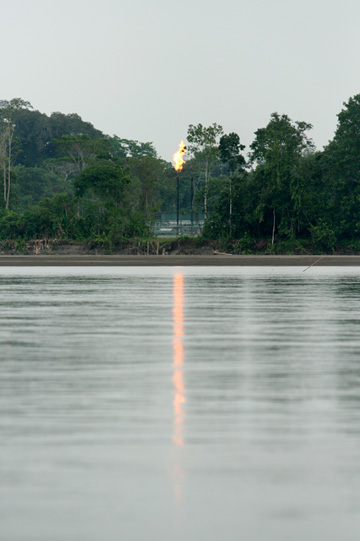As large-scale mining, logging, and plantations threaten indigenous communities worldwide, a new report from the indigenous rights NGO Amazon Watch states that when extractive industries work in indigenous people’s territories, the peoples’ rights must be respected. The report argues that all indigenous groups have the right to ‘free, prior, and informed consent’ of any resource extraction occurring on their lands, and that this international standard should be upheld not only for obvious moral reasons, but for sound business.
According to the report, when a company does not acquire free, prior and informed consent from indigenous groups they risk their investment. Money can easily be lost due to delays from local unrest, damage to the company’s reputation, loss of operating licenses, fleeing investors, and up to billions of dollars in litigation. Such financial risks, according to the report, are simply too great.
“As resource extraction increasingly moves into socially and environmentally fragile areas of the world, like the Amazon rainforest, companies must take affirmative steps to avoid violating indigenous peoples’ rights,” Gregor MacLennan, Peru Program Coordinator of Amazon Watch, said in a press release.
 Gas flare at an oil refinery in the Ecuadorian Amazon. Photo by Jeremy Hance. |
Recent history bears this out as Chevron is currently embroiled in a decades-long legal fight with indigenous people of the Ecuadorian Amazon for alleged water contamination due to oil pollution, which has led to high rates of cancer and other disease. The legal battle represents no small cost to Chevron, which, if it loses, could be forced to pay over $100 billion.
“The oil industry, for one, is in its infancy when it comes to developing and implementing policies to respect indigenous rights,” said Mitch Anderson, Corporate Campaigns Director for Amazon Watch in a press release. “Although some companies, such as Talisman Energy, are taking cautious steps forward, other companies, such as Chevron, appear to be burying their heads in the sand.
Another example comes from India where last year the environment ministry cancelled a proposed bauxite mine expansion by Vedanta Resources after protracted protests from the indigenous community known as Dongria in the area. Vedanta is still challenging the decision. The controvesary, and allegations of human rights violations, led the Church of England to disinvest from the company and several investors to sell off their shares.
The report adds that indigenous groups deserve special attention, since the impact of industry can be both devastating and irrevocable given indigenous peoples’ physical and spiritual connection to their land.
“[Indigenous people’s] territory is their market, pharmacy, hardware store, church, temple, and an integral part of their identity. They are completely dependent on a clean and healthy territory for survival and for the maintenance of their cultural integrity and identity as indigenous peoples. Extractive and infrastructure projects on indigenous lands potentially affect not just their means of sustenance and health, but also their rights to cultural survival and to choose their own future as a distinct people and culture.”
Related articles
Renewed conflict between tribes and oil companies looms in Peru
(01/06/2011) Indigenous peoples and their allies have intensified their fight against two oil companies over contamination in the Peruvian Amazon. Last week, a group of indigenous protesters blockaded portions of the Marañon and Corrientes Rivers in the province of Loreto in northeastern Peru. The protesters were demanding that Pluspetrol, an Argentinean oil company, compensate them for a recent oil spill. As of December 28th, after eight days, the blockade remained unbroken.
United States to back U.N. indigenous rights declaration
(12/23/2010) The United States will endorse the United Nations Declaration on the Rights of Indigenous People (UNDRIP), making it the last industrialized power to support the agreement, which recognizes the rights of indigenous peoples on issues including free prior and informed consent (FPIC), right to sovereignty, territory and respect for traditional knowledge. The move was announced last week by President Barack Obama.
Rainforest people sue logging company, Sarawak govt over planned deforestation
(12/22/2010) A community of forest people is taking a logging company and the state government of Sarawak to court over a plan to log 15,000 hectares of tropical rainforest, reports the Bruno Manser Fund.